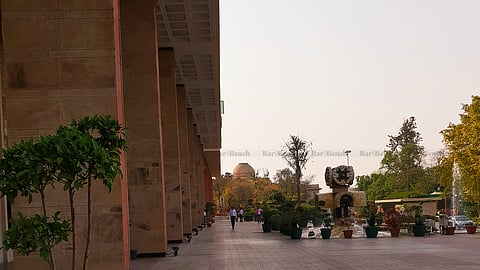
- Latest Legal News
- News
- Dealstreet
- Viewpoint
- Columns
- Interviews
- Law School
- Legal Jobs
- हिंदी
- ಕನ್ನಡ

The Delhi High Court on Monday refused to stay a single-judge order quashing Delhi government's orders which had forbidden private unaided schools from collecting Annual Charges and Development Fees from students till physical re-opening of the schools (DOE vs Action Committee of Inaided Private Recognised Schools).
A vacation bench of Justices Rekha Palli and Amit Bansal issued notice in the appeal preferred by Delhi government and other private parties against the Single Judge order.
The Court also took on record a statement made by private parties that till the next date of hearing, they will continue to follow the existing principles in matters of collection of fees from students.
The Court, at the very outset, stated that it was not inclined to issue any stay in the matter and would only seek response from the other parties for now.
As Senior Advocate Vikas Singh began his submissions on behalf of Delhi government, the Court remarked,
"Don't be a populist government. Give money to schools also."
Singh argued that the single-judge "gravely erred" when it arrived at the impugned conclusion on the basis of a Supreme Court order on collection of school fees.
Singh pointed out that the Single Judge overlooked the fact the Supreme Court judgement pertained to the State of Rajasthan and imposition of tuition fee was for a a time when schools had physically reopened there.
The Court was inter alia also informed that as per the schools' own affidavit, 60% of tuition fees was sufficient to discharge their liabilities towards salaries and the remaining amount could take care of other expenditure.
Delhi government also contended that the single-judge failed to appreciate the powers of Department of Education to pass such an order.
Singh prayed that the matter be remanded back to the single-judge for re-consideration. Standing Counsel Santosh Tripathi appeared along with Singh.
Grant of any stay on the single-judge order was opposed by the association of private schools. Senior Advocate Shyam Divan contended that Delhi government had no power to interdict private contracts.
He asserted that the impugned order was based on independent analysis as the single-judge was aware that the present facts and the law before the Supreme Court were only "somewhat similar".
Divan further argued that the single-judge had rightly ruled that there was no allegation of profiteering in the present case and, thus, there could be no interference by Delhi government.
"It is a no power issue," Divan said.
Advocate Khagesh Jha appeared for private appellants.
After hearing the parties, the Court stated that it was not inclined to pass any interim order of stay. The Court added that an order detailing the reasons behind the same would be uploaded later.
In its order, the Court said that it was prima facie inclined to agree with the Single Judge's finding that the Delhi School Education Act and Rules did not vest the Directorate with any power to issue directions passed in the present case.
"No doubt, the statute vests the Directorate with supervisory power to ensure that these private schools, chosen by students and their parents out of their own volition for the purpose of admission, do not indulge in commercialization and profiteering, however this right is salutary in nature and does not give any license to the Directorate to pass directions that it perceives would be in public interest, without any basis therefor.", the Court observed.
The Court further noted that managements of unaided, private schools received no aid from the Delhi government and were solely dependent on the fee collected by them to sustain their operations and premises and continue imparting education online.
In the absence of any action for profiteering and no material in support, the Court said that the contention that 40-60% of the tuition fee was enough for payment towards salaries was a bald claim.
The appeals would be heard next on July 12.
In the order under challenge, Justice Jayant Nath had held that the embargo created by Delhi government on collection of annual fees and development fees was prejudicial to the schools and would cause an unreasonable restriction in their functioning.
The Court acknowledged that the private recognized unaided schools were dependent only on the fees collected by them, observing that any order restricting powers to collect normal and usual fees will "create grave financial prejudice and harm to the schools".
The Court noted that admittedly, break-up of expenses related to Annual Charges and Developmental fees were those which would continue to be incurred by the schools irrespective of whether they were physically open or not.
Read the order: